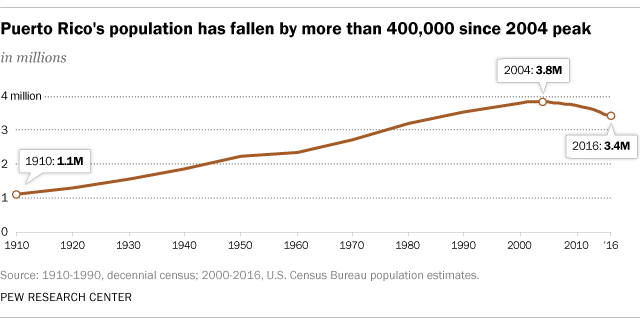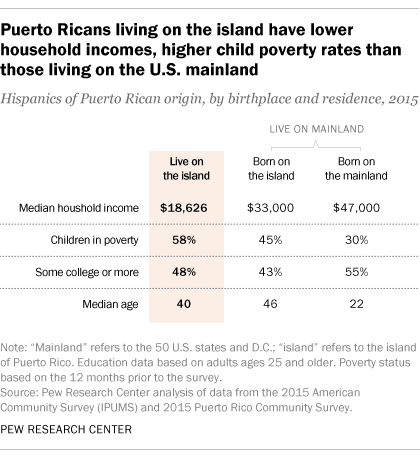This year marks the 100th anniversary of the U.S. government granting American citizenship to the residents of Puerto Rico. The island became a U.S. territory in 1898 after Spain ceded control of it following the Spanish-American War. However, Puerto Ricans did not gain U.S. citizenship until Congress passed the Jones-Shafroth Act in 1917.
Today, Puerto Rico is a U.S. territory with its own constitution and government (though the extent of the island’s legal independence from the United States has been the subject of debate). Island residents elect their own governor and members to the island’s legislature, but they may not vote in U.S. general elections for president and they do not have a voting member of Congress.
Here are answers to some key questions about Puerto Rico based on previously published Pew Research Center reports.
How many people live in Puerto Rico?
The population of the island was 3.4 million in 2016, down from a peak of more than 3.8 million in 2004. It is projected to decline in the coming decades, to about 3 million in 2050.

Puerto Rico’s population has grown steadily since at least the 1700s, and it increased each decade between 1910 (1.1 million) to 2000 (3.8 million). The population grew even during the Great Migration that occurred after World War II and into the 1960s, when hundreds of thousands left the island for the mainland.
Why is Puerto Rico’s population declining?

A decadelong economic recession has contributed to a historic number of people leaving Puerto Rico for the U.S. mainland. Between 2005 and 2015, Puerto Rico had a net loss of about 446,000 people to the mainland, with job-related (40%) and family or household reasons (39%) cited as primary causes among a plurality of those leaving.
Puerto Rico’s population losses have affected nearly every county, or municipio, on the island. The population of San Juan, Puerto Rico’s capital and largest metro area, declined by 40,000 people (-10%) between 2005 and 2015, to 355,000, by far the largest numeric drop of any municipio.
Many people who leave Puerto Rico move to Florida, where the population of Hispanics of Puerto Rican origin surpassed 1 million in 2014. In recent years, more than a third of people who moved to the mainland from Puerto Rico settled in Florida.
How do Puerto Ricans on the island differ demographically from Puerto Ricans on the mainland?

Hispanics of Puerto Rican origin living on the island have a lower median household income and a higher child poverty rate than Hispanics of Puerto Rican origin living on the U.S. mainland, according to a Pew Research Center analysis of 2015 Census Bureau data.
The median age of Puerto Ricans on the island was 40 in 2015, compared with 46 for the island-born living on the mainland. By comparison, the median age was only 22 for Puerto Rican-origin Hispanics born and living on the mainland.
The median household income of Puerto Ricans living on the island was $18,626 in 2015. It was more than twice as high among Puerto Ricans born and living on the mainland ($47,000) and island-born Puerto Ricans living on the mainland ($33,300).
Nearly six-in-ten Puerto Rican children on the island (58%) lived in poverty in 2015, as did 45% of island-born children living on the mainland. Only 30% of Puerto Rican children born on the mainland were in poverty.
There are some differences on educational attainment between Puerto Ricans on the island and the mainland. Nearly half (48%) of Puerto Ricans living on the island had at least some college education in 2015, a similar share (55%) to that of Puerto Ricans born and living on the mainland. Among island-born Puerto Ricans living on the mainland, 43% had some college education or more.
Puerto Ricans are overwhelmingly Christian. A majority (56%) of Puerto Ricans living on the island identified as Catholic in a 2014 Pew Research Center survey of religion in Latin America. And 33% identified as Protestants, among whom roughly half (48%) also identified as born-again Christians.
Among island-born Puerto Ricans living on the mainland, about half (53%) identified as Catholic in a separate 2013 survey of U.S. Hispanics. Three-in-ten identified as Protestant, most of whom (62%) say they are born-again or evangelical.
About four-in-ten Puerto Ricans born on the mainland (42%) identified as Catholic, while 30% said they were Protestant. Among these mainland-born Protestants, 80% identified as born-again.
How do the views of Puerto Ricans on the island and those on the mainland differ?
Pew Research Center surveys have found some notable differences in public opinion on social issues between Puerto Ricans living on the island and those living on the mainland. Puerto Ricans on the island, for example, are more likely to oppose abortion than those on the mainland. Our surveys found that roughly three-quarters (77%) of Puerto Ricans living on the island said that abortion should be illegal in all or most cases, compared with half (50%) of island-born Puerto Ricans living on the mainland and 42% of Puerto Ricans born and living on the mainland.
When it comes to same-sex marriage, 55% of Puerto Ricans on the island said that same-sex couples should not be allowed to legally wed, a higher share than among island-born Puerto Ricans living on the mainland (40%) and Puerto Ricans born and living on the mainland (29%).